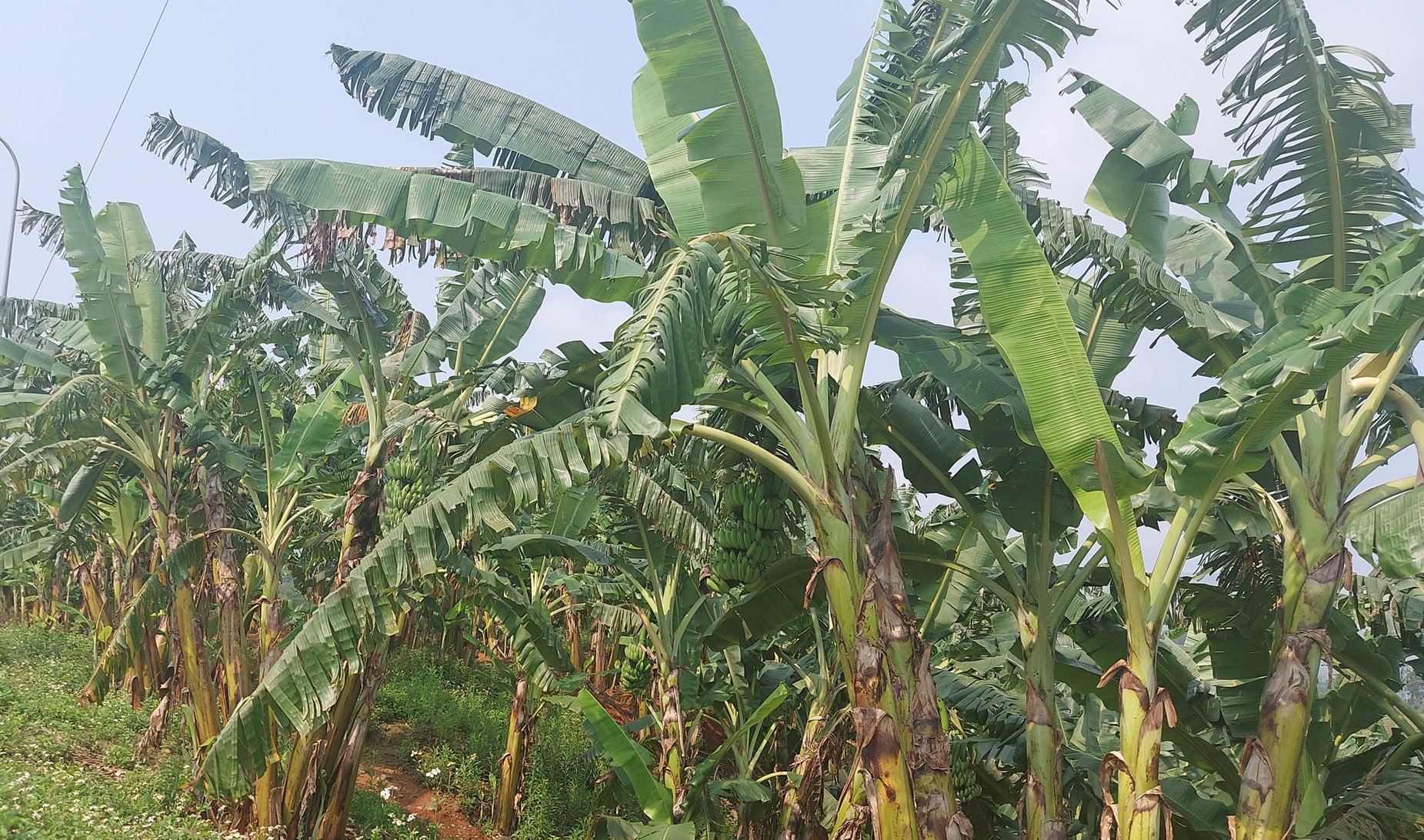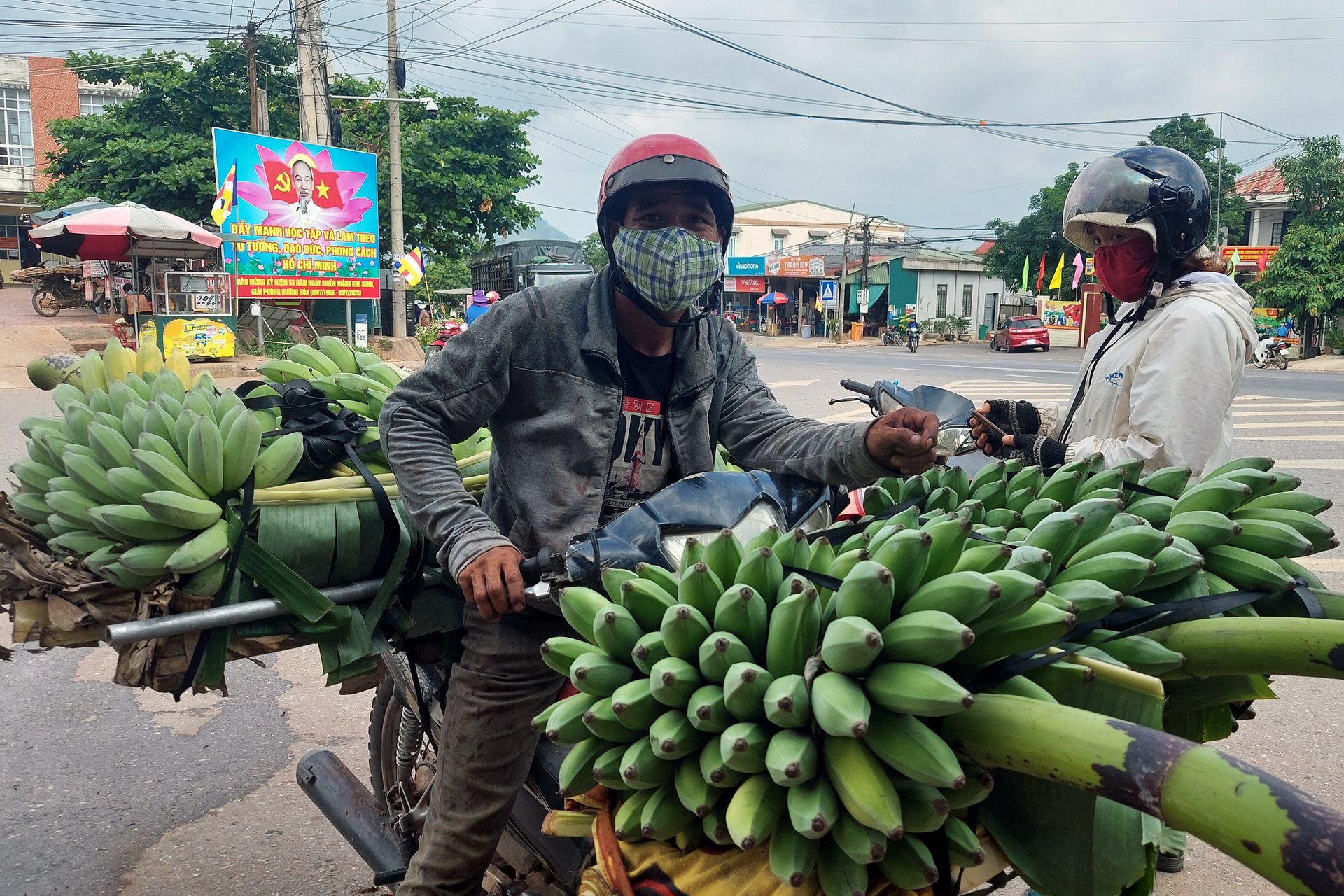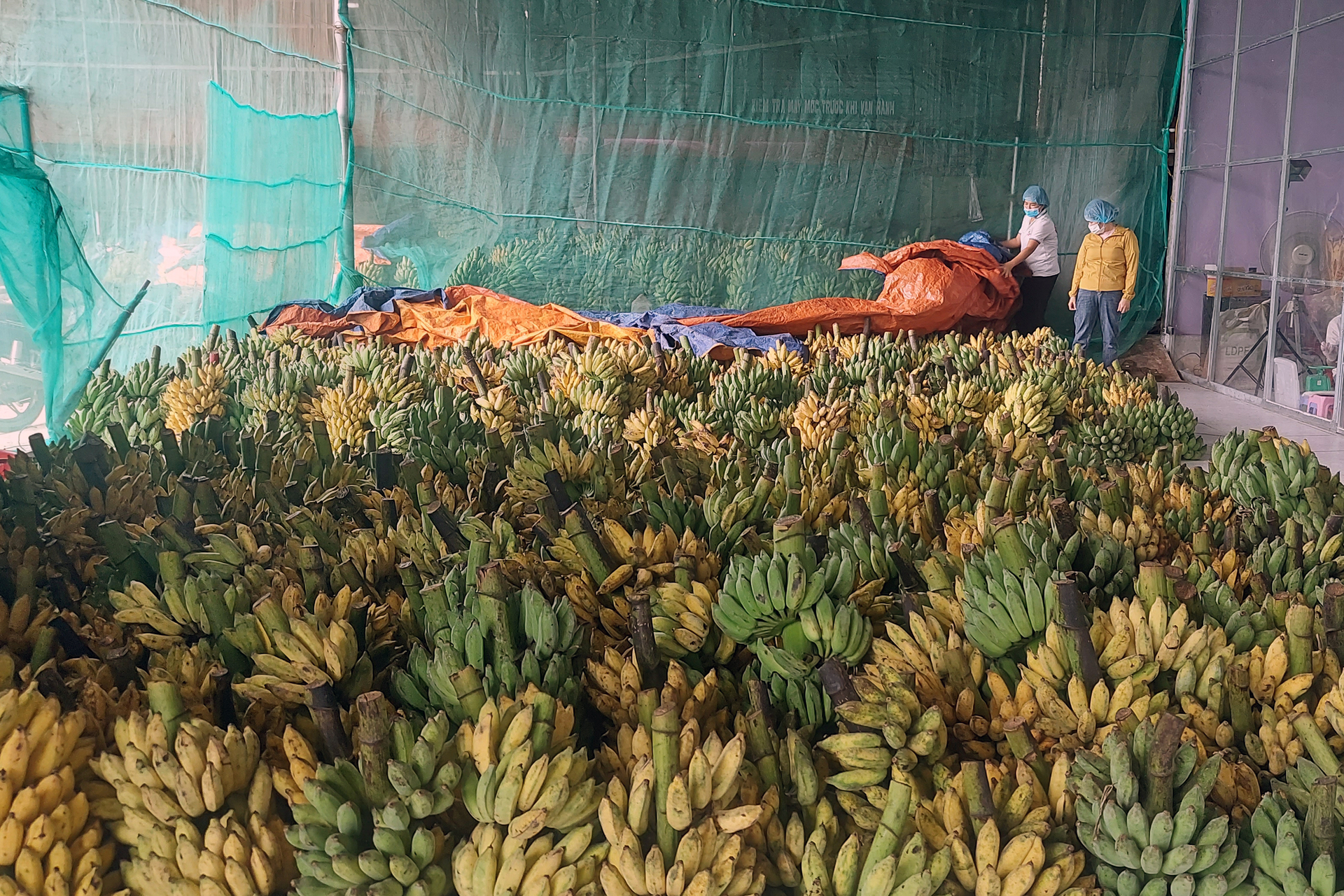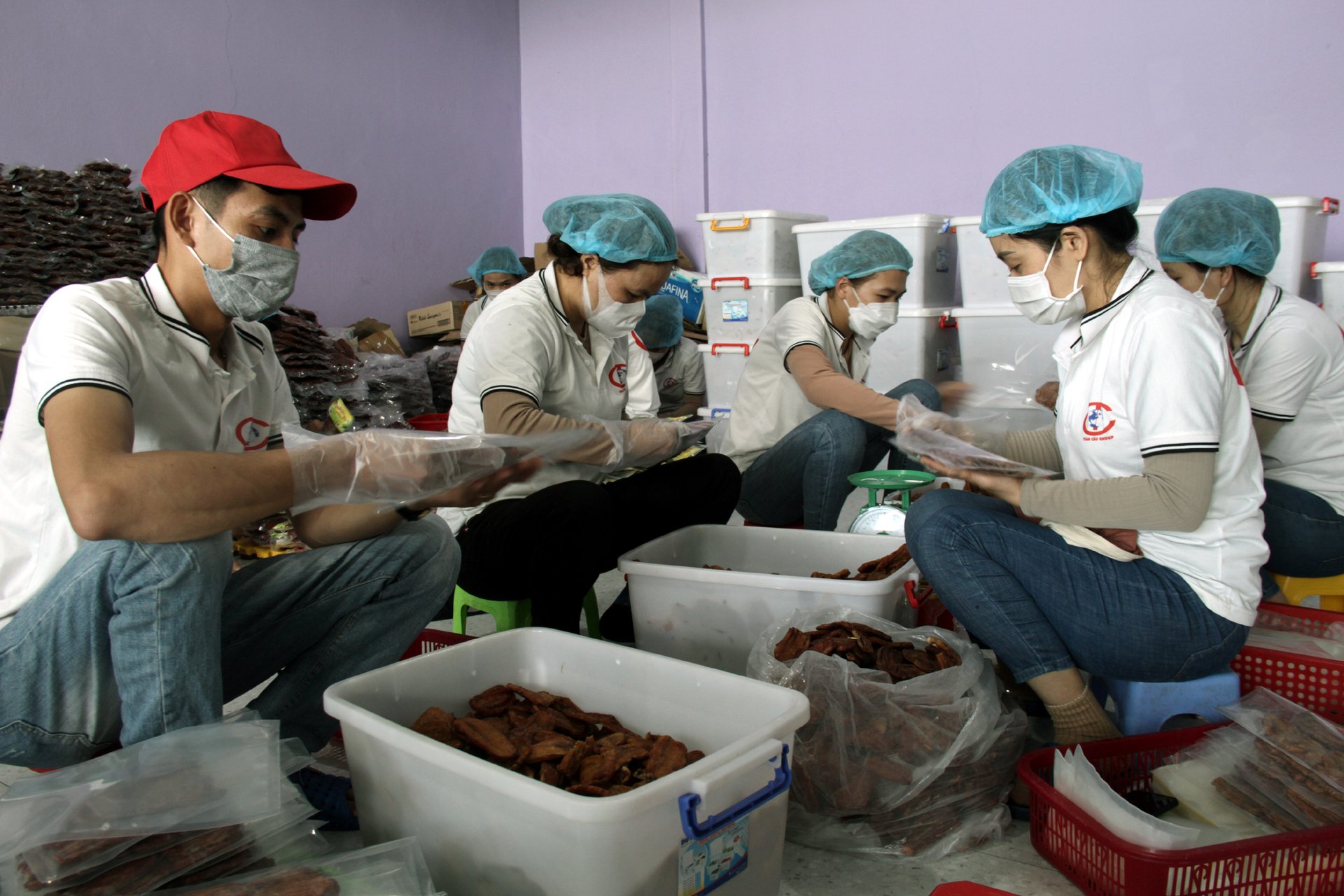November 25, 2025 | 15:11 GMT +7
November 25, 2025 | 15:11 GMT +7
Hotline: 0913.378.918
November 25, 2025 | 15:11 GMT +7
Hotline: 0913.378.918

Moldy bananas are mainly grown by the Pako Van Kieu people scattered on the hillsides. Photo: Vo Dung.
Moldy bananas are mainly grown by the Pako Van Kieu people in Tan Long, Tan Lien, Thuan, and Thanh communes... of Huong Hoa district. Due to the suitable soil and climate conditions, the moldy bananas grown on this land are famous for their beautiful designs and large, regular, and delicious fruits, even without pesticide spraying. The Pako Van Kieu people do not habitually fertilize crops on this land. Local people transport Moldy bananas to Tan Long market to sell to traders. After that, bananas will be gathered at points, and large trucks will be transported and imported for focal points in Hanoi, Thua Thien - Hue, Da Nang, Saigon, China, and Thailand.
A trader at Tan Long market said that for a few months now, moldy bananas had been exported to the Chinese market, so the atmosphere at the markets is also bustling. Larger trucks come to Tan Long market to "eat" goods. The price of bananas increased no matter how many traders bought them.
Huong Hoa district currently has 3.4 thousand hectares of moldy bananas, not to mention many households also go to Laos to rent land to grow bananas. Of these, 550 hectares are intercropped with macadamia trees, and 50 hectares of specialized cultivation are certified to meet VietGap standards. This entire area is currently planted and cared for by two businesses.

Moldy bananas are still mainly sold at Tan Long market. The price is not commensurate with the value. Photo: Vo Dung.
Possessing a large area of bananas, the quality is well received by the market, but the molasses in Huong Hoa is mainly sold at Tan Long market at an unequal price. That's what makes Huong Hoa's agricultural industry worry.
For Huong Hoa banana to have stable output, over the past time, the People's Committee of Huong Hoa district has had many preferential policies to attract businesses to purchase and process on the spot. However, buying volume is low; processed products are not diversified, so they do not have a large market. Banana honey mold in Huong Hoa currently revolves around a few processed products, such as dried bananas. These products help preserve bananas better, supporting consuming a part of banana production in the area. However, products that have not been processed deeply are mainly sold at stalls, serving popular needs, and have not yet given high economic efficiency.

In Quang Tri province, very few businesses buy and process moldy bananas. Photo: Vo Dung.
Mr. Hoang Dinh Binh, Head of the Agriculture Department of Huong Hoa district, said that although the area of bananas with moldy bananas is vast, the people are mainly scattered in a fragmented place. Most households only have 7 hectares of bananas, so investing in intensive farming to improve productivity is difficult. With the topography of Huong Hoa district, bananas are mainly grown on hillsides, with steep slopes that are difficult to care for, so they quickly degraded and had to be replanted. Moreover, from ancient times, the Pako Van Kieu people still keep their old farming practices, with little investment and care, so their productivity is low. These factors have made it challenging to attract businesses and cooperatives to participate in growing and processing moldy bananas in Huong Hoa over the past time.
"With the farming practices of the people, it is tough to grow high-yielding moldy bananas, let alone organic bananas. But difficult does not mean do not do. We are mobilizing banana growers to establish cooperatives to organize production and find stable outputs for bananas. Only cooperatives and businesses can organize the production of moldy bananas into large areas of raw materials to attract businesses to participate in on-site processing, helping people improve the value per unit area. We will build it into OCOP products of the province to widen the consumption road," said Mr. Binh.

Need businesses involved in planting, purchasing, and deep processing moldy bananas. Photo: Vo Dung.
Mr. Bui Phuoc Trang, Director of the Sub-Department of Cultivation and Plant Protection of Quang Tri, said that bananas are mainly grown in Huong Hoa and Dakrong districts with a total area of nearly 4,000 hectares. However, only about 2,000 hectares in Huong Hoa district have been granted 12 planting area codes. After entering the administrative boundaries of the communes, until now, Huong Hoa still has 9 area codes for growing bananas. This is necessary for Huong Hoa banana to be eligible for official export. The Chinese market is now open to Huong Hoa moldy bananas, but the export volume is still minimal, and the economic efficiency is not as expected. Very few of these are officially exported to the Chinese and Thai markets.
"The value will greatly increase if there are large-scale export moldy banana processing factories in Quang Tri. At that time, the economic efficiency from banana trees increased, and local workers also had more jobs to stabilize their lives", Mr. Trang shared.
Translated by Ha Phuc

(VAN) An Giang promotes supply-demand connections, standardizes quality and builds value chains, creating a foundation for sustainable bird’s nest development and aiming to expand exports.
/2025/11/24/5339-4-nongnghiep-075331.jpg)
(VAN) Recently, the conference on 'Sustainable Fisheries Linkage Chain - Tilapia for Export' took place in Tien Hai commune, Hung Yen province.
/2025/11/21/4309-2-153400_128.jpg)
(VAN) Green and low-emission rice is paving the way for Vietnamese rice to enter high-end markets, marking the beginning of a transformation journey toward greening and elevating the national rice brand.

(VAN) ‘Right to Win’ outlines a national action plan that shapes a new vision for Viet Nam’s agriculture in an era of renewal and global integration.

(VAN) Lam Dong’s farmed sturgeon output this year is expected to reach 2,300 tons, worth VND 450 billion, affirming the brand’s position on the market.

(VAN) A surge in Ukrainian egg exports, largely driven by soaring sales to the UK over the last few years, has notably pushed up egg prices on the domestic market.

(VAN) The price of Arabica Catimor coffee in Quang Tri is currently at VND 25,000–27,000/kg (fresh cherries), the highest level ever recorded